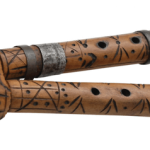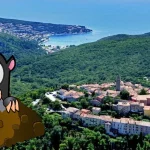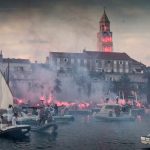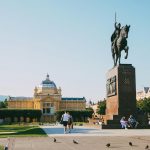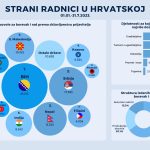As Poslovni Dnevnik/Darko Bicak writes, Lorena Boljuncic’s story is one of those that inspires and gives other women the courage they might be seeking to do something brave even when it seems impossible.
From a secure job in an international company, Lorena switched to the far less stable, far more challenging waters of entrepreneurship and launched several successful projects in Pula with her agency for the development of new cultural and tourist products, Idea Istra.
“My entry into private business wasn’t accidental, it was a conscious decision. After years of working in international companies, I felt I was ready for entrepreneurship. The different things that interested me during my life finally came together and I knew what area of work I wanted to create something in,” Lorena Boljuncic said.
Although culture is usually not a field, at least not here in Croatia, to which business is connected, Lorena took culture as the focus of her business development. “I was born in Pula, which is rich in historical heritage, I studied art history and I was always interested in how we talk about it and how we present our culture and history… how we present our destination through cultural heritage. During and after college, I travelled along the Croatian coast and collected materials/brochures from our historic cities. Culture has always been just an ornament, a beautiful picture in one general brochure, without much content. The museums had classic exhibits which were several decades old, with many artifacts, and without a story, without something whole, so few people entered, and no one cared about it,” explained Lorena Boljuncic.
She added that she also realised that Croatia as a tourist destination has many great opportunities to attract guests who aren’t only interested in the sun and the sea, but also travel because of cultural heritage, that this can be a reason to come and that various cultural and tourist products in a given destination must be made profitable. She says there are examples of this all over the world, especially here in Europe.
“Today, in general, everything is changing rapidly, we have an increasingly extensive network of heritage interpreters, great people who create interesting content, interactive museum exhibits are being created, cultural monuments are being restored. However, I have to say that there are a lot of projects that lack an entrepreneurial approach where you want to have as many guests as possible, making money from it so that you can reinvest and create new content. A lot of museums are still “waiting” for something to happen to them, for some money to come, instead of making a move on their own. On the one hand, there’s certainly a lack of knowledge in cultural management, and on the other hand, the owners, the public administration, don’t ask for specific goals to be met from the heads of institutions,” she stated.
Her most famous project is the House of Istrian Olive Oil, which is the first project, and not only in Croatia, which moves away from the classic settings with a lot of artifacts and gives a wide approach to knowledge of olive growing.
“There’s certainly an interesting historical story about the development of olive growing in Istria, from the Roman period until today. Modernity is quite well represented through the display of the assortment, which all olive growers must pay attention to in order to obtain quality extra virgin olive oil, which we learn through chemical and sensory analysis, etc. After that, each guest goes through a guided tasting session – a form of education where, according to international standards, we learn different categories of olive oil and how to recognise them. Our guests are incredibly surprised when they realise that most of what they buy in their stores isn’t real extra virgin olive oil, and that quality and healthy olive oil has different flavors and aromas,” Lorena Boljuncic noted.
She explained that her idea behind Idea Istra is a more transformational form of the presentation of cultural heritage, where guests not only get better acquainted with part of the cultural heritage and the present, but also learn something new that benefits them in everyday life.
For more, check out Made in Croatia.


